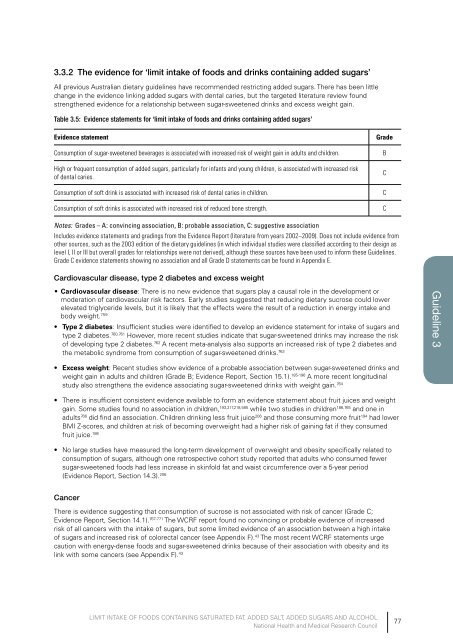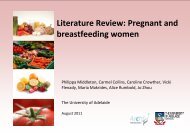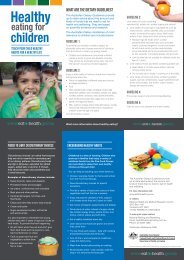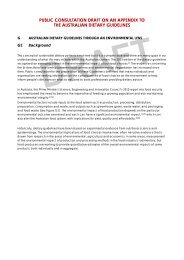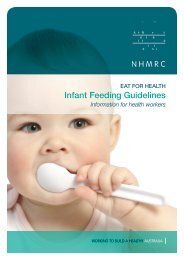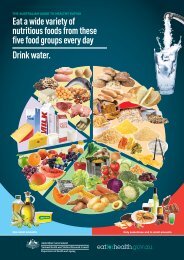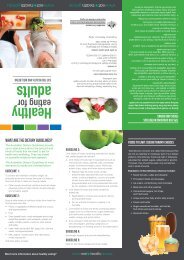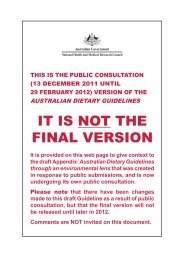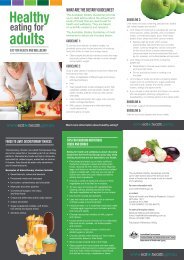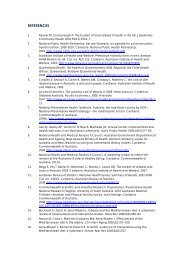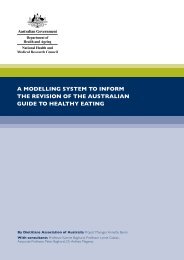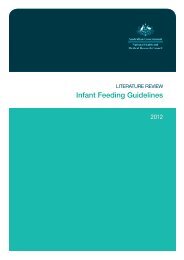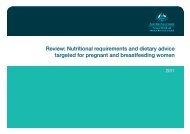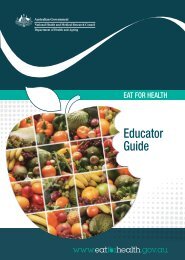Guidelines Dietary - Eat For Health
Guidelines Dietary - Eat For Health
Guidelines Dietary - Eat For Health
- No tags were found...
Create successful ePaper yourself
Turn your PDF publications into a flip-book with our unique Google optimized e-Paper software.
3.3.2 The evidence for ‘limit intake of foods and drinks containing added sugars’All previous Australian dietary guidelines have recommended restricting added sugars. There has been littlechange in the evidence linking added sugars with dental caries, but the targeted literature review foundstrengthened evidence for a relationship between sugar-sweetened drinks and excess weight gain.Table 3.5: Evidence statements for ‘limit intake of foods and drinks containing added sugars’Evidence statementConsumption of sugar-sweetened beverages is associated with increased risk of weight gain in adults and children.High or frequent consumption of added sugars, particularly for infants and young children, is associated with increased riskof dental caries.Consumption of soft drink is associated with increased risk of dental caries in children.Consumption of soft drinks is associated with increased risk of reduced bone strength.GradeBCCCNotes: Grades – A: convincing association, B: probable association, C: suggestive associationIncludes evidence statements and gradings from the Evidence Report (literature from years 2002–2009). Does not include evidence fromother sources, such as the 2003 edition of the dietary guidelines (in which individual studies were classified according to their design aslevel I, II or III but overall grades for relationships were not derived), although these sources have been used to inform these <strong>Guidelines</strong>.Grade C evidence statements showing no association and all Grade D statements can be found in Appendix E.Cardiovascular disease, type 2 diabetes and excess weight• Cardiovascular disease: There is no new evidence that sugars play a causal role in the development ormoderation of cardiovascular risk factors. Early studies suggested that reducing dietary sucrose could lowerelevated triglyceride levels, but it is likely that the effects were the result of a reduction in energy intake andbody weight. 759• Type 2 diabetes: Insufficient studies were identified to develop an evidence statement for intake of sugars andtype 2 diabetes. 760,761 However, more recent studies indicate that sugar-sweetened drinks may increase the riskof developing type 2 diabetes. 762 A recent meta-analysis also supports an increased risk of type 2 diabetes andthe metabolic syndrome from consumption of sugar-sweetened drinks. 763Guideline 3• Excess weight: Recent studies show evidence of a probable association between sugar-sweetened drinks andweight gain in adults and children (Grade B; Evidence Report, Section 15.1). 185-196 A more recent longitudinalstudy also strengthens the evidence associating sugar-sweetened drinks with weight gain. 764• There is insufficient consistent evidence available to form an evidence statement about fruit juices and weightgain. Some studies found no association in children, 193,217,218,585 while two studies in children 186,765 and one inadults 766 did find an association. Children drinking less fruit juice 206 and those consuming more fruit 194 had lowerBMI Z-scores, and children at risk of becoming overweight had a higher risk of gaining fat if they consumedfruit juice. 186• No large studies have measured the long-term development of overweight and obesity specifically related toconsumption of sugars, although one retrospective cohort study reported that adults who consumed fewersugar-sweetened foods had less increase in skinfold fat and waist circumference over a 5-year period(Evidence Report, Section 14.3). 206CancerThere is evidence suggesting that consumption of sucrose is not associated with risk of cancer (Grade C;Evidence Report, Section 14.1). 767-771 The WCRF report found no convincing or probable evidence of increasedrisk of all cancers with the intake of sugars, but some limited evidence of an association between a high intakeof sugars and increased risk of colorectal cancer (see Appendix F). 43 The most recent WCRF statements urgecaution with energy-dense foods and sugar-sweetened drinks because of their association with obesity and itslink with some cancers (see Appendix F). 43Limit intake of foods containing saturated fat, added salt, added sugars and alcoholNational <strong>Health</strong> and Medical Research Council77


